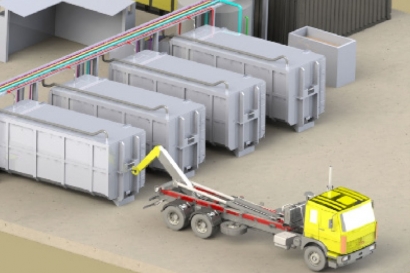
The technology, which produces fertilizer and natural gas from waste, was developed by the Federal University of Minas Gerais in partnership with companies Methanum Tecnologia Ambiental and Comlurb. The operation of the pilot plant, which was funded by BNDES, will allow testing the efficiency parameters of the methanization technology by anaerobic composting and widening the scale. With a processing capability of 30 daily tonnes, the plant has an estimated monthly biogas production capable of feeding a fleet of 1,000 cars or generating enough energy for just over a thousand houses.
The unit consists of modules the size of a container, which receive the waste and are sealed for a period of two to three weeks, while the bacteria introduced into the compartment degrade the organic matter and produce methane. The gas is stored while the remaining material is removed and used as fertilizer.
Microorganisms are sprayed into the modules through pipes with heavy use of electronics. Sensors and meters enable controlling and optimizing biogas production. The plant also has a generator to produce electric energy from gas combustion.
The Comlurb plant in Caju neighborhood was chosen because it receives solid waste from different neighborhoods, with different consumption and waste production standards, offering enough diversity to simulate the conditions of different Brazilian towns.

